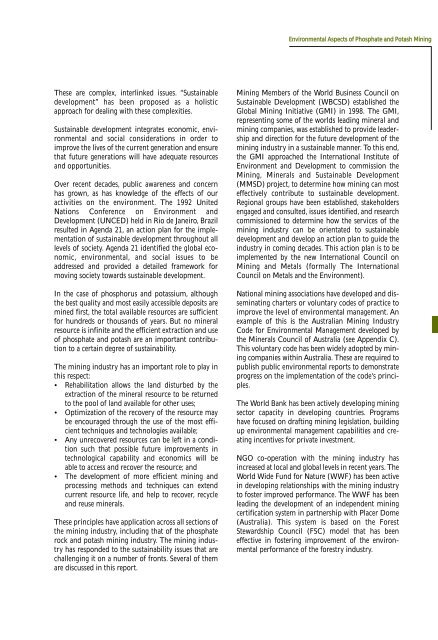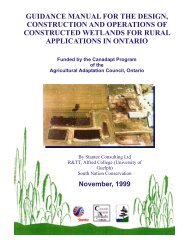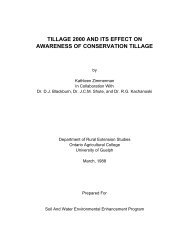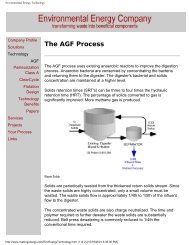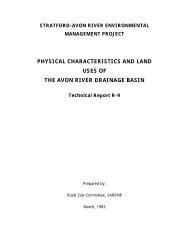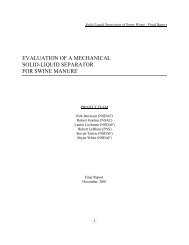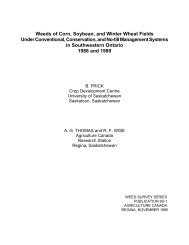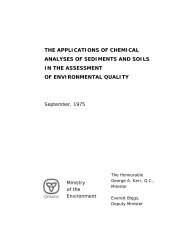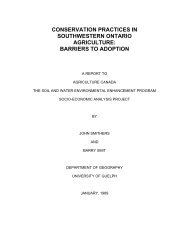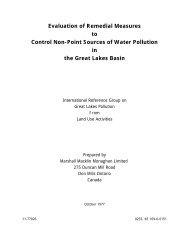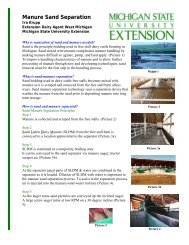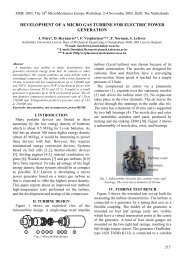Environmental Aspects of Phosphate and Potash Mining United ...
Environmental Aspects of Phosphate and Potash Mining United ...
Environmental Aspects of Phosphate and Potash Mining United ...
You also want an ePaper? Increase the reach of your titles
YUMPU automatically turns print PDFs into web optimized ePapers that Google loves.
<strong>Environmental</strong> <strong>Aspects</strong> <strong>of</strong> <strong>Phosphate</strong> <strong>and</strong> <strong>Potash</strong> <strong>Mining</strong><br />
These are complex, interlinked issues. “Sustainable<br />
development” has been proposed as a holistic<br />
approach for dealing with these complexities.<br />
Sustainable development integrates economic, environmental<br />
<strong>and</strong> social considerations in order to<br />
improve the lives <strong>of</strong> the current generation <strong>and</strong> ensure<br />
that future generations will have adequate resources<br />
<strong>and</strong> opportunities.<br />
Over recent decades, public awareness <strong>and</strong> concern<br />
has grown, as has knowledge <strong>of</strong> the effects <strong>of</strong> our<br />
activities on the environment. The 1992 <strong>United</strong><br />
Nations Conference on Environment <strong>and</strong><br />
Development (UNCED) held in Rio de Janeiro, Brazil<br />
resulted in Agenda 21, an action plan for the implementation<br />
<strong>of</strong> sustainable development throughout all<br />
levels <strong>of</strong> society. Agenda 21 identified the global economic,<br />
environmental, <strong>and</strong> social issues to be<br />
addressed <strong>and</strong> provided a detailed framework for<br />
moving society towards sustainable development.<br />
In the case <strong>of</strong> phosphorus <strong>and</strong> potassium, although<br />
the best quality <strong>and</strong> most easily accessible deposits are<br />
mined first, the total available resources are sufficient<br />
for hundreds or thous<strong>and</strong>s <strong>of</strong> years. But no mineral<br />
resource is infinite <strong>and</strong> the efficient extraction <strong>and</strong> use<br />
<strong>of</strong> phosphate <strong>and</strong> potash are an important contribution<br />
to a certain degree <strong>of</strong> sustainability.<br />
The mining industry has an important role to play in<br />
this respect:<br />
Rehabilitation allows the l<strong>and</strong> disturbed by the<br />
extraction <strong>of</strong> the mineral resource to be returned<br />
to the pool <strong>of</strong> l<strong>and</strong> available for other uses;<br />
Optimization <strong>of</strong> the recovery <strong>of</strong> the resource may<br />
be encouraged through the use <strong>of</strong> the most efficient<br />
techniques <strong>and</strong> technologies available;<br />
Any unrecovered resources can be left in a condition<br />
such that possible future improvements in<br />
technological capability <strong>and</strong> economics will be<br />
able to access <strong>and</strong> recover the resource; <strong>and</strong><br />
The development <strong>of</strong> more efficient mining <strong>and</strong><br />
processing methods <strong>and</strong> techniques can extend<br />
current resource life, <strong>and</strong> help to recover, recycle<br />
<strong>and</strong> reuse minerals.<br />
These principles have application across all sections <strong>of</strong><br />
the mining industry, including that <strong>of</strong> the phosphate<br />
rock <strong>and</strong> potash mining industry. The mining industry<br />
has responded to the sustainability issues that are<br />
challenging it on a number <strong>of</strong> fronts. Several <strong>of</strong> them<br />
are discussed in this report.<br />
<strong>Mining</strong> Members <strong>of</strong> the World Business Council on<br />
Sustainable Development (WBCSD) established the<br />
Global <strong>Mining</strong> Initiative (GMI) in 1998. The GMI,<br />
representing some <strong>of</strong> the worlds leading mineral <strong>and</strong><br />
mining companies, was established to provide leadership<br />
<strong>and</strong> direction for the future development <strong>of</strong> the<br />
mining industry in a sustainable manner. To this end,<br />
the GMI approached the International Institute <strong>of</strong><br />
Environment <strong>and</strong> Development to commission the<br />
<strong>Mining</strong>, Minerals <strong>and</strong> Sustainable Development<br />
(MMSD) project, to determine how mining can most<br />
effectively contribute to sustainable development.<br />
Regional groups have been established, stakeholders<br />
engaged <strong>and</strong> consulted, issues identified, <strong>and</strong> research<br />
commissioned to determine how the services <strong>of</strong> the<br />
mining industry can be orientated to sustainable<br />
development <strong>and</strong> develop an action plan to guide the<br />
industry in coming decades. This action plan is to be<br />
implemented by the new International Council on<br />
<strong>Mining</strong> <strong>and</strong> Metals (formally The International<br />
Council on Metals <strong>and</strong> the Environment).<br />
National mining associations have developed <strong>and</strong> disseminating<br />
charters or voluntary codes <strong>of</strong> practice to<br />
improve the level <strong>of</strong> environmental management. An<br />
example <strong>of</strong> this is the Australian <strong>Mining</strong> Industry<br />
Code for <strong>Environmental</strong> Management developed by<br />
the Minerals Council <strong>of</strong> Australia (see Appendix C).<br />
This voluntary code has been widely adopted by mining<br />
companies within Australia. These are required to<br />
publish public environmental reports to demonstrate<br />
progress on the implementation <strong>of</strong> the code's principles.<br />
The World Bank has been actively developing mining<br />
sector capacity in developing countries. Programs<br />
have focused on drafting mining legislation, building<br />
up environmental management capabilities <strong>and</strong> creating<br />
incentives for private investment.<br />
NGO co-operation with the mining industry has<br />
increased at local <strong>and</strong> global levels in recent years. The<br />
World Wide Fund for Nature (WWF) has been active<br />
in developing relationships with the mining industry<br />
to foster improved performance. The WWF has been<br />
leading the development <strong>of</strong> an independent mining<br />
certification system in partnership with Placer Dome<br />
(Australia). This system is based on the Forest<br />
Stewardship Council (FSC) model that has been<br />
effective in fostering improvement <strong>of</strong> the environmental<br />
performance <strong>of</strong> the forestry industry.


